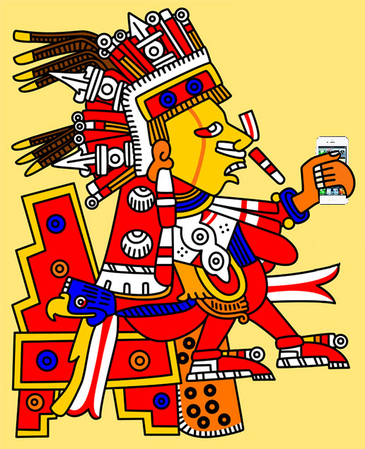Between Stockholm Syndrome and Lima Syndrome
Part 43: "The Most Brutal Slaveholders were Always the Most Devout"

Many religions have attempted to make statues of their gods very large,
and the idea is to make us feel small.
But if that's their purpose, they can keep their paltry icons.
We need only to look up if we wish to feel small.
-CARL SAGAN (1934-1996)
Recently, after four years of research, Elicka Peterson Sparks, an associate professor of criminology at the Department of Government and Justice Studies at Appalachian State University in Boone, NC, published The Devil You Know: the Surprising Link Between Conservative Christianity and Crime (2016). To many Christians this book is shockingly controversial. To me it is incomplete because fundamentalism is not only a thorn within Christianity, but also within other religions: Islam, Judaism, Hinduism and even some branches of Buddhism.
Sparks' thesis should not be surprising, especially if we are willing to consider the preponderance of evidence throughout the history of Homo sapiens. As cited in Part 9 (An Eskimo Hunter and the Local Missionary Priest), the positive correlation between religion and violence has been established since the Aztecs fervently believed in sacrificing thousands of innocent men, women and babies merely to appease Huitzilopochtli (god of the south), Tezcatlipoca (god of the north), Huehueteotl (god of the fire), Tlaloc (god of the rain), and Xipe Totec (god of the east and water). For the sake of appeasing those gods, the Aztecs committed homicide and infanticide with impunity.
Indeed more modern left-brain dominated believers have been killing each other fervently in the name of God, Allah, or Yahweh as well. Or, other modern versions of Huitzilopochtli. As stated previously "religion" derives from the word religare (Latin) which means 'to bind.' Perhaps, not surprisingly, the more oppressive a religion is, the more oppressive are its believers. "The most brutal slaveholders were always the most devout," observed African-American social reformer, abolitionist, and author Frederick Douglass (1818-1895). As summarized in Part 10 (The Pope who would have Burned his own Father), Mahatma Gandhi (a Hindu) was killed by a Hindu zealot in 1948; Anwar Sadat (a Muslim) was killed by a Muslim zealot in 1981; and Yitzhak Rabin (a Jew) was killed by a Jewish zealot in 1995. As observed by Dr. Taylor, anal-retentive obsession on the past and future—from the original sin to the last day judgment, from the Battle of Armageddon to heaven and hell, from resurrection to the second coming, even martyrdom, whether in Judaism, Christianity, Islam eschatologies—can only radicalize the poorly educated and betray the spirit of religion.
History merely repeats itself: The Roman Catholic Church launched a series of Crusades between 1096 and 1487. In God and his Demons (2010), Michael Parenti cites a chronicler who joined and rejoiced the Crusade of 1099: "Wonderful things were to be seen. Numbers of Saracens were beheaded… Others were shot with arrows, or forced to jump from the towers; others were tortured for several days, then burned with flames. In the street were seen piles of heads and hands and feet... It was a just and marvelous judgment of God." If that is not brutal enough, starting in the 12th century, the Church then engaged in their notorious witch-trials as well as the Spanish, Portuguese and Roman Inquisitions.
In Islam, Sunni and Shiite Muslims have been slaughtering each other for 1,380 years ... all due an unsettled dispute over who would be the legitimate successor of Muhammad as a caliph of the Islamic community upon his death in 632. Other sects in Islam, particularly Ahmadiyya and Sufism, have also been labeled as "heretics and non-Muslim" by the Sunnis. Thousands of Ahmadis and Sufis in Bangladesh, Indonesia, Pakistan, and Saudi Arabia, have been subjected to cruel persecution and systematic oppression, even public stoning. Basically the current civil war in Syria since 2011 is a proxy war between Saudi Arabia (representing the Sunnis) and Iran (representing the Shiites). The Hebrew scriptures recount battle after battle in which Yahweh helps the "Chosen People" to not only defeat but also exterminate shepherding cultures which had occupied the "Promised Land" for centuries before 1948. The cruelty of ISIS—which has decapitated innocent journalists, humanitarian aid workers and minorities in the name of Allah—simply confirms the pattern.
Indeed the cruelest irony in religion. If one wholeheartedly believes in monotheism—there is only one God, or Allah, or Yahweh; merely implying multiple Gods is considered a blasphemy—why on earth do monotheistic believers have to kill their fellow believers? (Not that I condone harming polytheists or atheists.) Juxtapose this narrow-minded reductionism with the nonchalant holism of American astronomer, cosmologist and astrophysicist Carl Sagan (1934-1996) who did not even believe in a God: "If a human disagrees with you, let him live. In a hundred billion galaxies you will not find another."
There is still another irony: Our Abrahamic forefathers had used the movements of celestial objects in the universe—particularly the phases of the moon and the rotations of the sun—as temporal references in the lunar and solar calendars to mark and celebrate so-called religious holidays and festivities. Isn't it another cruel irony that their believers now forget their smallness in the very same stupendous and gargantuan universe by merely claiming that "my" religion is better and holier than "yours"?
Indeed Carl Sagan's tolerance for pluralism and compassion for fellow earthlings speak volumes. "As I read history," wrote American literary critic Carl Van Doren (1885-1950), "the unbelievers have done less harm to the world than believers. They have not filled it with savage wars… with crusades or persecutions, with complacency or ignorance."
[To be continued.]
Johannes Tan, Indonesian Translator & Conference Interpreter
and the idea is to make us feel small.
But if that's their purpose, they can keep their paltry icons.
We need only to look up if we wish to feel small.
-CARL SAGAN (1934-1996)
Recently, after four years of research, Elicka Peterson Sparks, an associate professor of criminology at the Department of Government and Justice Studies at Appalachian State University in Boone, NC, published The Devil You Know: the Surprising Link Between Conservative Christianity and Crime (2016). To many Christians this book is shockingly controversial. To me it is incomplete because fundamentalism is not only a thorn within Christianity, but also within other religions: Islam, Judaism, Hinduism and even some branches of Buddhism.
Sparks' thesis should not be surprising, especially if we are willing to consider the preponderance of evidence throughout the history of Homo sapiens. As cited in Part 9 (An Eskimo Hunter and the Local Missionary Priest), the positive correlation between religion and violence has been established since the Aztecs fervently believed in sacrificing thousands of innocent men, women and babies merely to appease Huitzilopochtli (god of the south), Tezcatlipoca (god of the north), Huehueteotl (god of the fire), Tlaloc (god of the rain), and Xipe Totec (god of the east and water). For the sake of appeasing those gods, the Aztecs committed homicide and infanticide with impunity.
Indeed more modern left-brain dominated believers have been killing each other fervently in the name of God, Allah, or Yahweh as well. Or, other modern versions of Huitzilopochtli. As stated previously "religion" derives from the word religare (Latin) which means 'to bind.' Perhaps, not surprisingly, the more oppressive a religion is, the more oppressive are its believers. "The most brutal slaveholders were always the most devout," observed African-American social reformer, abolitionist, and author Frederick Douglass (1818-1895). As summarized in Part 10 (The Pope who would have Burned his own Father), Mahatma Gandhi (a Hindu) was killed by a Hindu zealot in 1948; Anwar Sadat (a Muslim) was killed by a Muslim zealot in 1981; and Yitzhak Rabin (a Jew) was killed by a Jewish zealot in 1995. As observed by Dr. Taylor, anal-retentive obsession on the past and future—from the original sin to the last day judgment, from the Battle of Armageddon to heaven and hell, from resurrection to the second coming, even martyrdom, whether in Judaism, Christianity, Islam eschatologies—can only radicalize the poorly educated and betray the spirit of religion.
History merely repeats itself: The Roman Catholic Church launched a series of Crusades between 1096 and 1487. In God and his Demons (2010), Michael Parenti cites a chronicler who joined and rejoiced the Crusade of 1099: "Wonderful things were to be seen. Numbers of Saracens were beheaded… Others were shot with arrows, or forced to jump from the towers; others were tortured for several days, then burned with flames. In the street were seen piles of heads and hands and feet... It was a just and marvelous judgment of God." If that is not brutal enough, starting in the 12th century, the Church then engaged in their notorious witch-trials as well as the Spanish, Portuguese and Roman Inquisitions.
In Islam, Sunni and Shiite Muslims have been slaughtering each other for 1,380 years ... all due an unsettled dispute over who would be the legitimate successor of Muhammad as a caliph of the Islamic community upon his death in 632. Other sects in Islam, particularly Ahmadiyya and Sufism, have also been labeled as "heretics and non-Muslim" by the Sunnis. Thousands of Ahmadis and Sufis in Bangladesh, Indonesia, Pakistan, and Saudi Arabia, have been subjected to cruel persecution and systematic oppression, even public stoning. Basically the current civil war in Syria since 2011 is a proxy war between Saudi Arabia (representing the Sunnis) and Iran (representing the Shiites). The Hebrew scriptures recount battle after battle in which Yahweh helps the "Chosen People" to not only defeat but also exterminate shepherding cultures which had occupied the "Promised Land" for centuries before 1948. The cruelty of ISIS—which has decapitated innocent journalists, humanitarian aid workers and minorities in the name of Allah—simply confirms the pattern.
Indeed the cruelest irony in religion. If one wholeheartedly believes in monotheism—there is only one God, or Allah, or Yahweh; merely implying multiple Gods is considered a blasphemy—why on earth do monotheistic believers have to kill their fellow believers? (Not that I condone harming polytheists or atheists.) Juxtapose this narrow-minded reductionism with the nonchalant holism of American astronomer, cosmologist and astrophysicist Carl Sagan (1934-1996) who did not even believe in a God: "If a human disagrees with you, let him live. In a hundred billion galaxies you will not find another."
There is still another irony: Our Abrahamic forefathers had used the movements of celestial objects in the universe—particularly the phases of the moon and the rotations of the sun—as temporal references in the lunar and solar calendars to mark and celebrate so-called religious holidays and festivities. Isn't it another cruel irony that their believers now forget their smallness in the very same stupendous and gargantuan universe by merely claiming that "my" religion is better and holier than "yours"?
Indeed Carl Sagan's tolerance for pluralism and compassion for fellow earthlings speak volumes. "As I read history," wrote American literary critic Carl Van Doren (1885-1950), "the unbelievers have done less harm to the world than believers. They have not filled it with savage wars… with crusades or persecutions, with complacency or ignorance."
[To be continued.]
Johannes Tan, Indonesian Translator & Conference Interpreter

 RSS Feed
RSS Feed